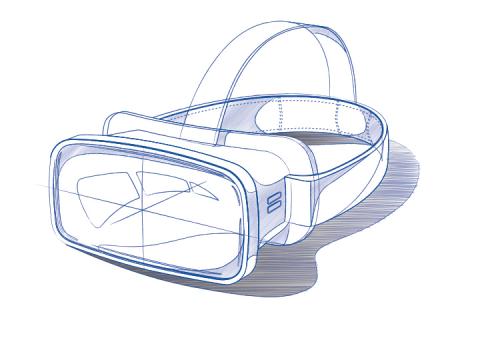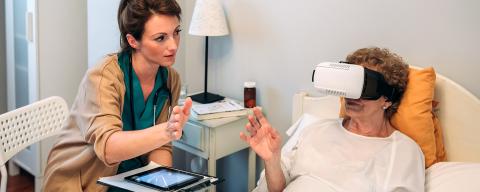New Technology for Older Adults
Older adults living in rural communities in New Hampshire face challenges posed by remoteness, including access to healthcare and social isolation. In Sullivan County, work is underway to try to address those challenges through new and emerging technologies.
In 2023, UNH’s Center for Digital Health Innovation received a $129,746 USDA Rural Development grant to equip rural communities with video conferencing, assistive technologies and virtual reality equipment. The grant included funds for UNH Extension’s Sullivan County office, where Michele Kroll serves as an older adult behavioral health and well-being field specialist.
Kroll, who earned a doctorate in learning technologies, has been training staffing clinicians at Sullivan County Health Care, the county’s nursing home, on how to use the equipment. She’s researching how these systems make a difference, asking questions like, “How does new technology affect nursing staff members’ workflow? What are the patients’ responses to it? How might it help residents who have had strokes or who have conditions like Alzheimer’s disease?”
The equipment includes a fully mobile robot that can be wheeled around the nursing home for telehealth visits, helping patients with a variety of checkups and assessments. A digital scale provides a fast and simple way to measure body weight remotely. Patient readings taken with the scale are synchronized in near real-time with the patient’s healthcare portal.
A physical and occupational therapy product assists with rehabilitation of hands. The system consists of an ergonomic wearable glove and physical therapy software. This allows the therapist to work within the patient’s movement ability.

A virtual reality system provides over 100 immersive experiences for mental health, including 360-degree, instructor-guided and self-guided travel and nature experiences.
“They can swim with whales or look at the Northern Lights or do a breathing exercise. There’s one program for veterans where they can see all the war memorials through an immersive 3D experience,” Kroll says.
The residents can also connect with family, friends or a mental healthcare provider virtually during these sessions. “This is really great for social isolation, especially in the winter months,” she says.
The nursing home is undergoing a construction project, which means that every patient, including those in the Alzheimer’s unit, will need to be moved. To aid this process, UNH nursing students have been developing a socio-environmental assessment to pair nursing home residents as roommates.
“It’s almost like a matching program you would do in college; it’s based on criteria such as physical needs and social needs. Some questions they’re asking are, ‘Do you need a right-hand grab bar or a left-hand grab bar? Are you a night person? Do you need special therapies that might interfere with a roommate?’”
Once the nursing students finalize their assessment, they’ll work with the computer science and business departments at UNH to develop an app. Healthcare staff will then review the “matches” and consider what they know about the residents on a personal level.
Beyond Sullivan County, the USDA grant is serving communities in Strafford, Carroll and Grafton counties, as well as Kennebec County in Maine, reaching approximately 70,000 rural residents.
Check Out Our New Health & Well-Being Page
Our specialists help create healthy people and healthy places in New Hampshire.
Featured LINK
Mental Health Resources for New Hampshire - a printable county-specific guide to help New Hampshire residents find local, state, and national mental health resources.

